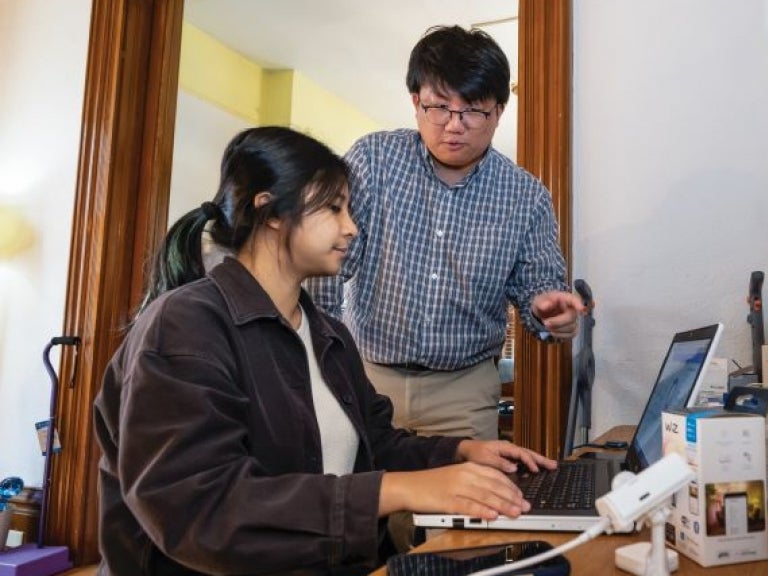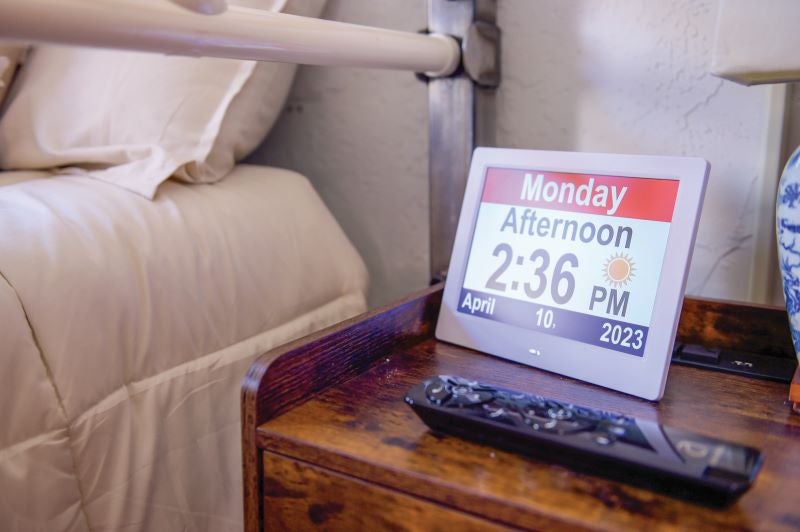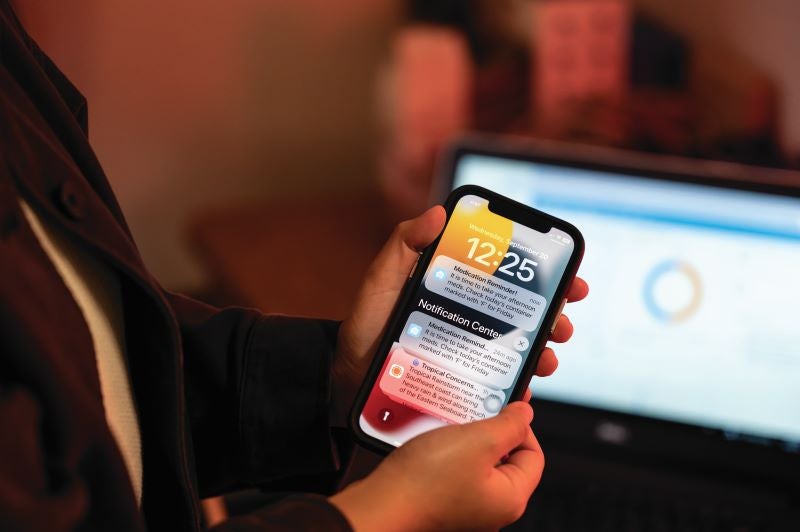
Health Informatics Assistant Professor Yong Choi, standing, discusses smart home technology with student researcher, Sukritta Suksawang, at the Healthy Home Lab.
Yong Choi grew up in South Korea, the son of a physician who frequently treated older patients. The more time the boy spent in his father’s medical practice, the more he was touched by the compassion and attentiveness of his father as he tried to help his patients overcome the challenges of old age.
Now an assistant professor in the Department of Health Information Management (HIM) and a co-director of the Smart Home Tech Division of the Healthy Home Laboratory (HHL), Choi finds himself serving as a remote family caregiver, a world away from his aging parents—but at the forefront of helping older adults age in place.
Ever since his days in graduate school, Choi has been committed to developing smart technologies designed for older adults. “Coming to SHRS and having the opportunity to pursue my passion in an environment that supports collaboration and forward-thinking research was a great decision for me,” says Choi.
“I’m especially impressed with the mission of the Healthy Home Lab, where we can conduct real-world research and find practical solutions that help older adults and their caregivers,” he continues.
Choi’s research focuses on examining the unique needs of older adults and incorporating them into technologies that provide health and wellness solutions.
“It’s fundamentally about making technology accessible and easy for older adults,” says Choi.
Choi explores the integration of smart speakers and digital AI assistants with various digital health devices, such as Bluetooth-enabled blood pressure meters, weight scales and glucose meters, consolidating and interpreting data into a comprehensive and intelligent health management system for older adults.
“Picture a scenario where an individual managing both high blood pressure and diabetes can ask, ‘Alexa, how have my blood pressure and blood sugar levels been fluctuating this week?’ and receive a response that not only provides the data but also analyzes trends and offers insights, such as, ‘Your blood sugar has been following a similar pattern as usual but I’ve noticed your blood pressure has been consistently higher compared to the previous week. Should I share these findings with your health care provider?’” Choi illustrates.
Choi sees a future where technology does more than just answer our health questions but also anticipates your needs, being one step ahead to help you make the best health decisions.
He offers a simple example: Instead of the technology just sharing blood sugar levels when asked, it might say, “I’ve noticed your blood sugar goes up a bit in the evenings. Want some tips on dinner choices that might help keep it stable?”
“If an older adult needs reminders to take their medication, we can set up digital display messages at their bedside when they wake up in the morning or when they come down to the kitchen for breakfast,” continues Choi.

Bedside monitors can remind older adults to take medications.
This kind of friendly, smart and context-aware technology could change the way older adults manage their health, turning a journey that can sometimes feel confusing and lonely into one in which they always have a supportive companion to help guide the way.
Graduate bioengineering student Sukritta Suksawang works alongside Choi at the HHL as a research assistant, helping to implement one of Choi’s projects: Care360: Remote Monitoring Portal for Enhanced Elderly Care.
Suksawang says the portal utilizes a range of smart technologies and currently includes five monitoring tasks: medication management, indoor temperature monitoring, bathroom usage, bedroom activity and wandering behavior—with more to come.
“Care360 will help to deliver peace of mind for both older adults and their caregivers,” explains Suksawang.

Medication reminders can be set, and caregivers can be notified through the Care360 portal.
User and caregiver training is built into the Care360 technology offering.
“We are fortunate to partner with the University of Pittsburgh’s Center for Social and Urban Research and its Regional Research Registry,” explains Choi. “This gives us access to nearly 1,000 older adults and their caregivers—individuals who are willing to participate in focus groups and provide insight and feedback around how our technology is designed and used.”
Professor and HIM Chair Bambang Parmanto says Choi’s expertise is an ideal fit for the work being done at the HHL.
“Dr. Choi has strong backgrounds in informatics and health with a focus on aging and design thinking,” explains Parmanto. “His unique background makes him a perfect fit for initiatives that are being developed to support people who want to age gracefully in their homes.”
------------------------
This article originally appeared in the Fall 2023 issue of Facets magazine. Continue reading these articles about the Healthy Home Lab:
- Pitt’s Healthy Home Lab: Home Sweet Healthy Home
- The Pitt Healthy Home Lab was Once a Family Home
- The Pitt Healthy Home Lab is a New Home for Student Training
- Pamela Toto named director of the Healthy Home Lab
.
